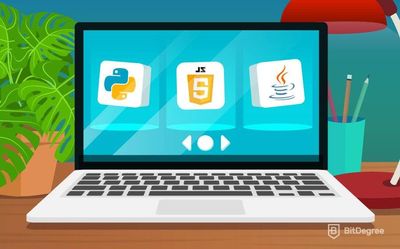 If you’ve been into web development and its surrounding topics for a while now, you’ve probably noticed that Node JS keeps popping up in conversations involving JavaScript and back-end development. This isn’t a coincidence - as time goes on, more and more people are using Node JS for web development - the tool has been receiving a lot of attention as of late. Simultaneously, various high-salary and career opportunity providing jobs have started surfacing all around. If you’re a passionate web developer and would like to use Node JS not only for your projects but in a company and as a career-building tool - great! This Node JS interview questions tutorial is just what you need!
If you’ve been into web development and its surrounding topics for a while now, you’ve probably noticed that Node JS keeps popping up in conversations involving JavaScript and back-end development. This isn’t a coincidence - as time goes on, more and more people are using Node JS for web development - the tool has been receiving a lot of attention as of late. Simultaneously, various high-salary and career opportunity providing jobs have started surfacing all around. If you’re a passionate web developer and would like to use Node JS not only for your projects but in a company and as a career-building tool - great! This Node JS interview questions tutorial is just what you need!
In this guide, you will find some of the most popular questions that employers ask their potential employees. Whether it be the basic questions surrounding JavaScript or Node itself, or advanced queries about back-end development - this tutorial will help you prepare!
Table of Contents
- 1. The Basics of Node JS
- 1.1. Question 1: What is Node JS?
- 1.2. Question 2: Why should people use Node JS?
- 1.3. Question 3: Can you name the features of Node JS?
- 1.4. Question 4: What’s the difference between ‘front-end’ and ‘back-end’ development?
- 1.5. Question 5: Can you explain what is ‘callback’ in Node JS?
- 1.6. Question 6: What are ‘stubs’?
- 1.7. Question 7: Describe ‘callback hell’.
- 1.8. Question 8: What’s an ‘event’?
- 1.9. Question 9: What is ‘event-driven’ programming?
- 1.10. Question 10: What’s the point of Node JS being ‘single-threaded’?
- 1.11. Question 11: What are ‘worker processes’?
- 1.12. Question 12: What is Express JS?
- 1.13. Question 13: Do you know what are the functionalities of Node Package Manager In Node JS?
- 1.14. Question 14: What is chaining in Node JS?
- 1.15. Question 15: Explain what is a ‘stream’ and what are the types of it.
- 2. Advanced Node JS Interview Questions
- 2.1. Question 1: What is ‘demultiplexer’?
- 2.2. Question 2: What is ‘REPL’ and what does it do?
- 2.3. Question 3: What’s the difference between ‘blocking’ and ‘non-blocking’ functions?
- 2.4. Question 4: Does Node JS posses ‘child threads’?
- 2.5. Question 5: What are the main security implementations within Node JS?
- 3. Summary
The Basics of Node JS
Just to be consistent, we’ll start the tutorial off by covering the basic questions and answers that you should know before a job interview. Employers like to ask these questions at the beginning of the interview after you introduce and talk a little bit about yourself.
Latest Deal Active Right Now:
EXCLUSIVE 25% OFF
On DataCamp Subscriptions
Follow the Datacamp promo code link & get an exclusive 25% OFF Datacamp subscriptions. Act now while the offer is still available!
There are a lot of reasons why that's the case, and some of them might not be as obvious as the others. First of all, this is a really good tactic for the employer to get to know you as a person. The way that you answer the questions, where you pause and stop to think and other small details like that can say a lot about you - especially about the amount of work that you have put into studying the subject.
Another reason why these basic Node JS interview questions are so important is so that the interviewers could check your base knowledge level on Node JS. Once they evaluate your skill level, they’ll then decide what type (and how difficult) of advanced interview questions on Node JS they should give you later on.
All in all, it is important that you don’t brush the basic questions off just because they might be “easy” or “not important”. The fact of the matter is, beginner-level inquiries might be more important than the advanced ones - after all, they determine the flow of the rest of the interview.
Question 1: What is Node JS?
You can probably imagine that out of all of the basic Node JS interview questions out there, this one is the staple one. Naturally, it is also often the first (or one of the first) question that you’re going to get asked in the interview.
Even proficient Node JS experts sometimes struggle to answer this question smoothly. Now, why would that be, you might think? Well, when you’re mostly concerned about the advanced level features that Node JS can offer, you might tend to forget the very basic definitions. More often than not, it is pretty difficult to define this tool in a single, concise sentence.
That being said, however, there are quite a few great, down-to-earth and straightforward explanations available online. Some of them are short and simple, others go a little bit more in-depth for additional information - you can easily choose the one that suits you the best.
Just so that you wouldn’t need to wander through the web, let me provide a clear and to-the-point answer to this question.
Node JS is a JavaScript-based tool that’s designed to perform back-end development and implementation processes. You could say that this is the most TL;DR version available.
Question 2: Why should people use Node JS?
One of the more subjective Node JS interview questions, you simply need to state your opinion about the tool and its strengths. Since there are quite a few, you can choose the ones that seem to interest or benefit you the most.
A few examples of possible answers that you could give: it’s fast, asynchronous, provides a single, generalized programming language and type of data, etc.
All around, Node JS is simply one of the best tools in the current market when it comes to JavaScript-based server-side development.
Question 3: Can you name the features of Node JS?
Node JS is a single-threaded, highly scalable system that utilizes JavaScript as a scripting language. It uses an asynchronous, event-driven input/output and can achieve high output via single-threaded event loop and non-blocking I/O.
Question 4: What’s the difference between ‘front-end’ and ‘back-end’ development?
Now, this is one of those Node JS interview questions that might throw you off guard, since it’s not directly related to Node JS. However, if you are a developer, it should also be one of the easiest questions to answer. It all boils down to how you formulate it.
Front-end developers are concerned with the client (user) side of the webpage. They work on, develop and maintain everything that the client sees - in other words, they are responsible for the visual (design) and functionality (like buttons, banners, etc.) parts of the page. As opposed to that, back-end developers focus on the processes happening in the background - things that the clients don’t see. They are also responsible for the functionality of the site, just from a broader, closer-to-the-core perspective.
Since this is one of those Node JS interview questions that allows you to elaborate, you could also mention that web developers who can perform the actions and responsibilities of both back and front-end development are called full-stack developers.
Question 5: Can you explain what is ‘callback’ in Node JS?
A callback is a function that is called after a given task. Being an asynchronous platform, Node JS heavily relies on a callback. It allows other codes to be run in the meantime and prevents any blocking. All Application Programming Interfaces on Node JS is made to support callbacks.
Question 6: What are ‘stubs’?
Stubs are certain functions that mimic the behavior of specific modules. They are most often used in test cases since they can provide the answers needed to solve some of the issues that might arise within the modules.
Question 7: Describe ‘callback hell’.
An interesting term in of itself, callback hells happen when vast amounts of callbacks nest (stack) into one specific place, thus becoming impossible to read and - overall - work with.
This being one of the descriptive Node JS interview questions allows you to further your answer and mention that callback hells can be solved. This is done with the help of what is known as the modularization process. The way that it works is that this process simply breaks the callbacks into separate functions, independent from one another.
Question 8: What’s an ‘event’?
Events are one of the main functions of Node JS. They symbolize some sort of an action taken or move made within the webpage. They are managed by an event handler, which writes the code required to execute these events.
Question 9: What is ‘event-driven’ programming?
Previous Node JS interview questions talked about events and callbacks, so this should come off as quite an easy question at this point in the tutorial.
Event-driven programming, as the name implies, is a form of programming that is concerned with and based on events. Whenever an event happens, there are callbacks issued to the main server, in turn retrieving the information required for that specific event.
Question 10: What’s the point of Node JS being ‘single-threaded’?
You could probably say that this is one of the tougher Node JS interview questions since it requires you to know both the benefits of single-threading and what it is.
Single-threading allows Node JS to perform async processing. If you’re working on a default web load, single-threading enables a smoother and faster working process - which is exactly what web developers are looking for!
Question 11: What are ‘worker processes’?
Worker processes are simply those processes that are running in the background while you’re doing something else. They can send emails, set variables and so on. They are extremely useful since they save web developers a lot of time and energy by doing these tedious tasks.
Question 12: What is Express JS?
This is yet another one of the Node JS interview questions that do not directly relate to any of the Node functions in particular. However, it is still important to know what Express JS is since it is explicitly designed for Node JS.
Express JS is a light-weight framework that is created to help Node deal with some of the more tedious tasks of web development. It’s a great help in developing both web pages and mobile apps.
Question 13: Do you know what are the functionalities of Node Package Manager In Node JS?
NPM offers its’ two main functionalities:
An online repository for Node JS packages.
Command-line utility for installing packages, version and dependency management for Node JS packages.
Question 14: What is chaining in Node JS?
Chaining is a mechanism by which the output of one stream is connected to the other stream creating a chain of several stream operations.
Question 15: Explain what is a ‘stream’ and what are the types of it.
A stream is an object that allows the reading of data from a source and writing of data to the destination as a continuous process.
There are 4 different types of it:
Readable - to facilitate the reading operation.
Writable - to facilitate the writing operation.
Duplex - to facilitate writing and reading operations.
Transform - it is a form of Duplex stream that performs computations based on available input.
Advanced Node JS Interview Questions
Now that we’ve covered some of the most popular questions for beginners, lets transition and move on to the ones that are for experienced web developers.

These questions aren’t going to be a shocker or anything - your interviewers probably aren’t going to ask you to create a web page from scratch during your job interview. However, you will have to show some advanced level knowledge with some of these questions - after all, they aren’t called advanced without a reason!
Question 1: What is ‘demultiplexer’?
Although it is simply a “what is a ..?” type of a question, it truly does belong in this section of Node JS interview questions and answers for experienced developers. It isn’t a term that you would encounter all that often - especially if you’re just starting to work with Node JS.
The demultiplexer is a notification-issuing interface within the Node JS. It is used to gather information from specific events and form ques, thus providing what is known as an Event Que.
Question 2: What is ‘REPL’ and what does it do?
REPL abbreviates to “Read, Evaluate, Print, Loop”. This shell is used to perform specific JavaScript statements.
Question 3: What’s the difference between ‘blocking’ and ‘non-blocking’ functions?
When you issue a blocking function, every other piece of code is stopped from running and is kept halted until the specific, designated I/O event is completed. As opposed to that, non-blocking functions allow the developers to perform multiple tasks (keep multiple different codes running live) while simultaneously performing a number of I/O events.
Question 4: Does Node JS posses ‘child threads’?
Some Node JS interview questions might want to trick you - this is exactly one of them.
If your initial thought was “no”, you are sadly mistaken. Even though Node JS is a single-thread service, it still does have child threads - it simply does not display them to the developer. So, watch out for such tricky questions!

- Easy to use with a learn-by-doing approach
- Offers quality content
- Gamified in-browser coding experience
- Free certificates of completion
- Focused on data science skills
- Flexible learning timetable

- High-quality courses
- Nanodegree programs
- Student Career services
- Nanodegree programs
- Suitable for enterprises
- Paid certificates of completion

- A wide range of learning programs
- University-level courses
- Easy to navigate
- University-level courses
- Suitable for enterprises
- Verified certificates of completion
Question 5: What are the main security implementations within Node JS?
The main ones include (but are not limited to) authentications and error handling. These are the two methods most commonly associated with security management within Node JS - and they do seem to work well!

Did you know?
Have you ever wondered which online learning platforms are the best for your career?
Summary
In this tutorial, we have managed to cover both the basics and Node JS interview questions and answers for experienced developers - all in one go!
If you’re looking for a job as a specialized Node JS web developer, you would do well to study the questions and answers provided in this guide well. Try to memorize the information, but at the same time think about it yourself - your employers will quickly brush you off if they notice that all you do is recite Wikipedia texts and have no critical thinking skills of your own.

Try to follow-up the more expansive questions by providing thorough answers that not only answer the question but also expand on the topic and show your competence in the field of web development with Node JS. Your follow-ups should be short and sweet, however - two to three sentences are more than enough. Don’t go on a tangent about single-threaded processes or server-side development - you’ll get the chance to show your passion extensively once you get the job.













